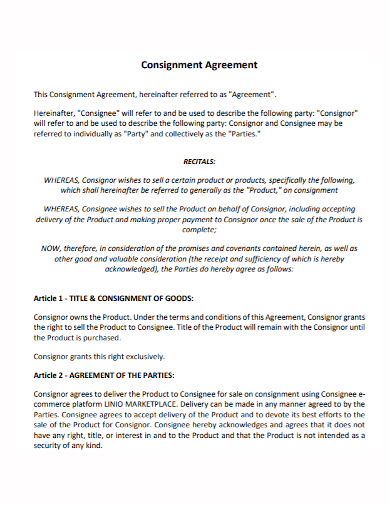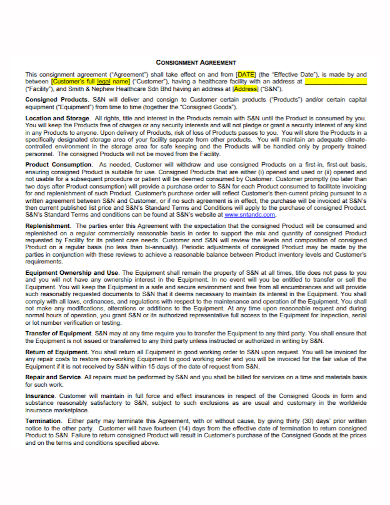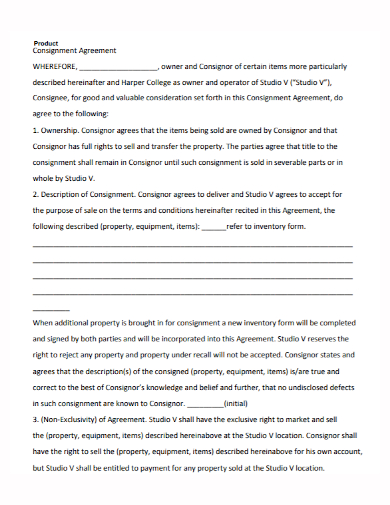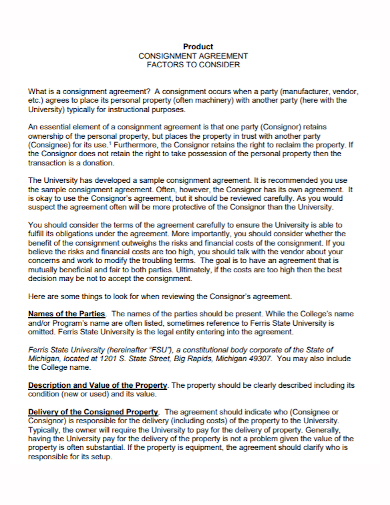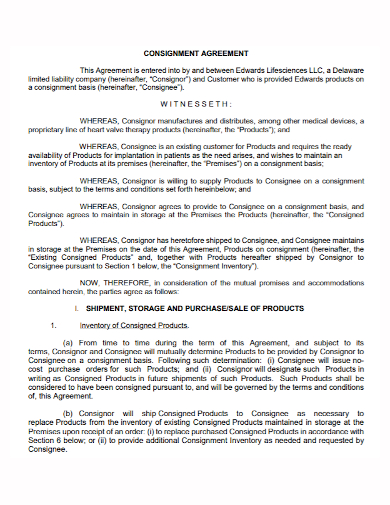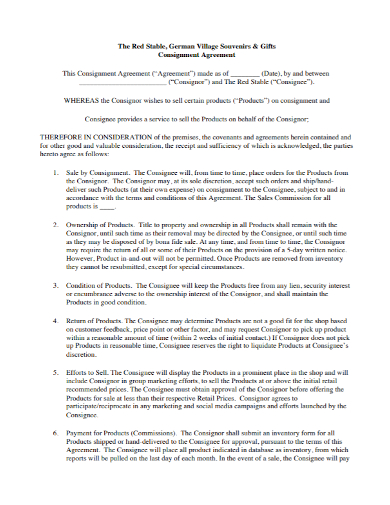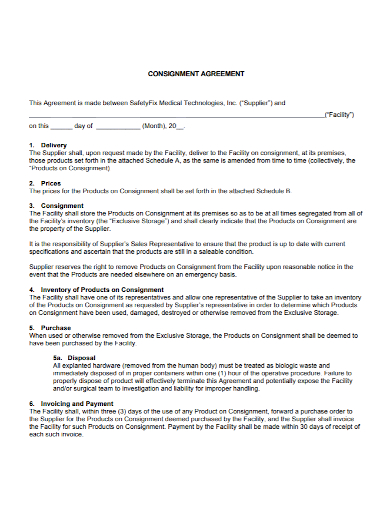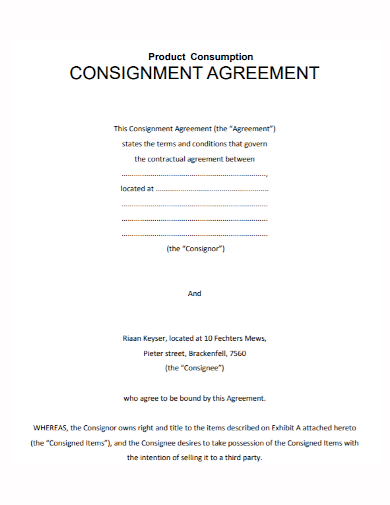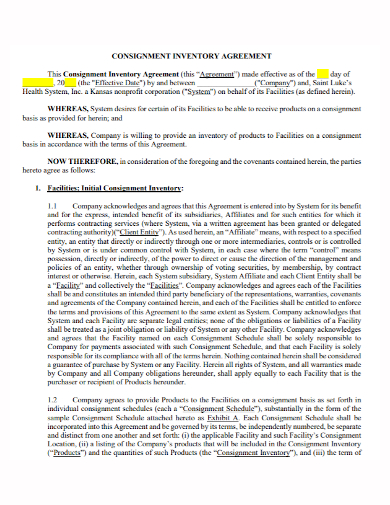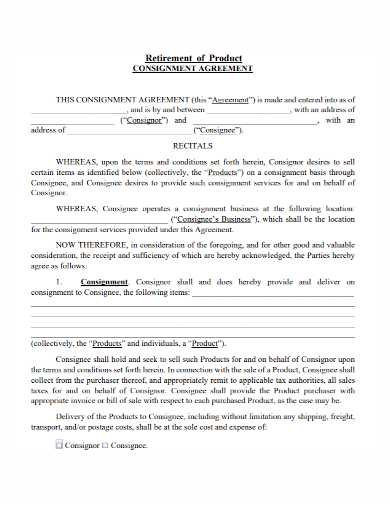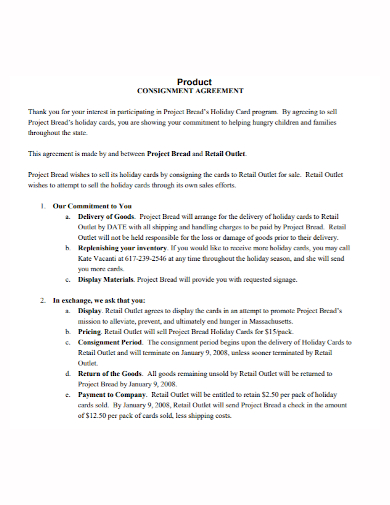So-called consignment shops have become fashionable in the twenty-first century, particularly those that sell specialty items, infant wear, pet care, and high-end fashion. Millennials are known for their thrifty shopping habits, which include avoiding high-end stores and designer boutiques in favor of bargains found at thrift and consignment shops. Rising student debt, stagnant wages, and the psychological effects of the Great Recession of 2007-2009 are all factors driving younger shoppers to consignment shops and other discount stores, according to economists.
10+ Product Consignment Agreement Samples
If your small business does not have its own store or physical location to sell goods, selling your products on consignment may be an option. Many retailers are willing to accept new items on consignment in order to bolster their inventory. You’d be effectively lending your products to a store to sell on your behalf. The difference between a consignment contract and a wholesale agreement is that you are not selling your products to the store. The retailer is acting as a third party, an intermediary who works on your behalf to generate compensation from the sale, which typically ranges from 20% to 60%.
1. Product Consignment Agreement
2. Product Equipment Consignment Agreement
3. Ownership Product Consignment Agreement
4. Property Product Consignment Agreement
5. Product Shipment Consignment Agreement
6. Product Sale Consignment Agreement
7. Inventory Product Consignment Agreement
8. Sample Product Consignment Agreement
9. Company Product Consignment Agreement
10. Retirement of Product Consignment Agreement
11. Product Project Consignment Agreement
Advantages of Consignment
Although consignment arrangements can also exist in cyberspace, selling on consignment is a great option for an individual or business that does not have a brick-and-mortar presence. Online consignment shops, such as eBay, are similar to consignment shops in that they provide people with a marketplace to display and sell their wares in exchange for a percentage of the sale. This eliminates the need for a person to build their own website, attract customers, and set up payment procedures. Consignment also includes items marketed and sold through television channels, such as the as-seen-on-TV phenomenon.
Sellers who do not have the time or desire to advertise their product for sale, take time off work to accommodate prospective buyers’ schedules, conduct pricing research, or endure the tasks involved in selling an item firsthand often find that a consignment fee is a small price to pay to have the work done for them, especially if they are successful in negotiating a low fee.
Types of Businesses Which Can Use Consignment
Consignment could be beneficial to any small business that sells products that could be physically placed in another store. Consignment contracts can benefit businesses that specialize in clothing, toys, accessories, and other popular store items. Craft businesses that make handmade items like cards, jewelry, and artwork are also viable options. These companies lack the financial resources or product volume to open their own store and instead sell online. Consignment, on the other hand, can help them get their items in front of customers in a physical store.
Disadvantages of Consignment
The most significant disadvantage of selling your products on consignment is that you do not receive the entire profit. Consignees can receive up to 60% in compensation for selling your goods, which must be taken into account when calculating how much it costs you to make or buy the goods in the first place.
FAQs
What is the consignment payment structure?
A person who wants to sell something on consignment gives it to a consignment shop or a third party who will sell it for them. Before the third party takes possession of the item, a revenue split must be agreed upon when the item is sold.
What is the benefit of consignment for a small business?
The main advantage of a consignment is that it allows small businesses to sell their products without having to invest in a storefront. Paying rent for a store and payroll for staff to manage it without a guarantee of sufficient sales is both costly and risky, and it isn’t a viable option for many small businesses.
If you want to see more samples and formats, check out some product consignment agreement samples and templates provided in the article for your reference.
Related Posts
FREE 10+ Mentoring Agreement Samples In MS Word | Apple Pages | PDF
FREE 10+ Partner Agreement Samples In MS Word | Google Docs | Apple Pages | PDF
FREE 10+ Individual Agreement Samples In MS Word | Google Docs | Apple Pages | PDF
FREE 10+ Strategic Agreement Samples In MS Word | Google Docs | Apple Pages | PDF
FREE 10+ Equity Agreement Samples In MS Word | Google Docs | Apple Pages | PDF
FREE 10+ Producer Agreement Samples in MS Word | Apple Pages | PDF
FREE 10+ Grant Agreement Samples In MS Word | Apple Pages | PDF
FREE 8+ Meeting Agreement Samples in MS Word | Google Docs | Apple Pages | PDF
FREE 10+ Community Agreement Samples In MS Word | Google Docs | PDF
FREE 8+ Real Estate Option Agreement Samples in MS Word | PDF
FREE 10+ Call Option Agreement Samples In MS Word | PDF
FREE 10+ Advertising Agreement Samples In MS Word | Google Docs | Apple Pages | PDF
FREE 10+ Car Agreement Samples In MS Word | Google Docs | Apple Pages | PDF
FREE 10+ Horse Agreement Samples In MS Word | Apple Pages | PDF
FREE 10+ Option Agreement Samples In MS Word | Google Docs | Apple Pages | PDF

